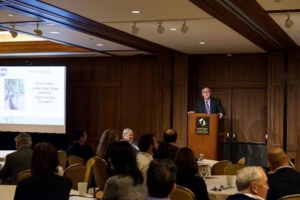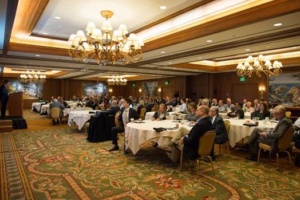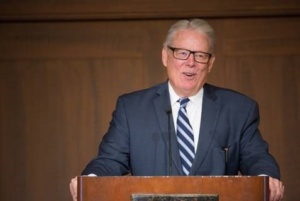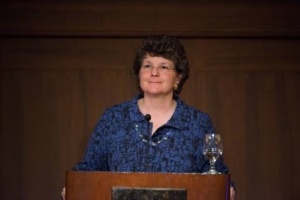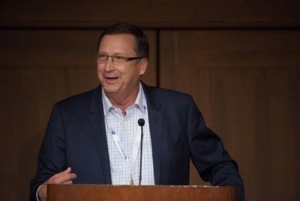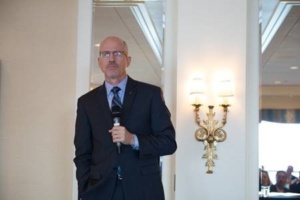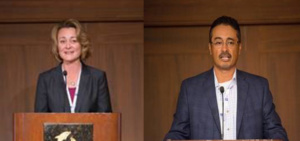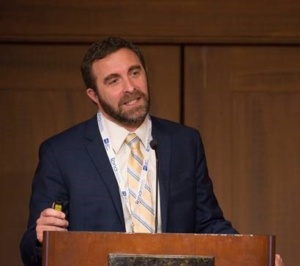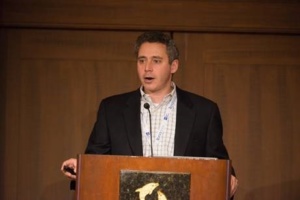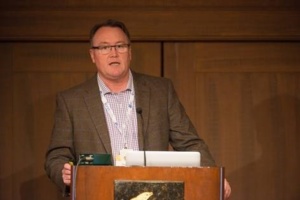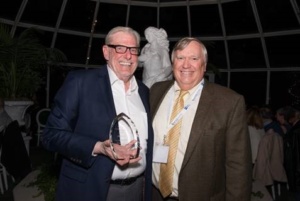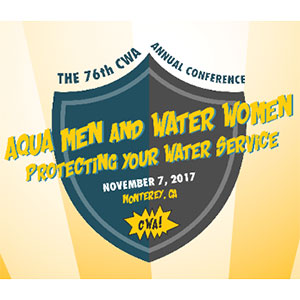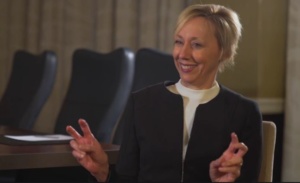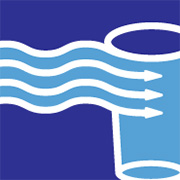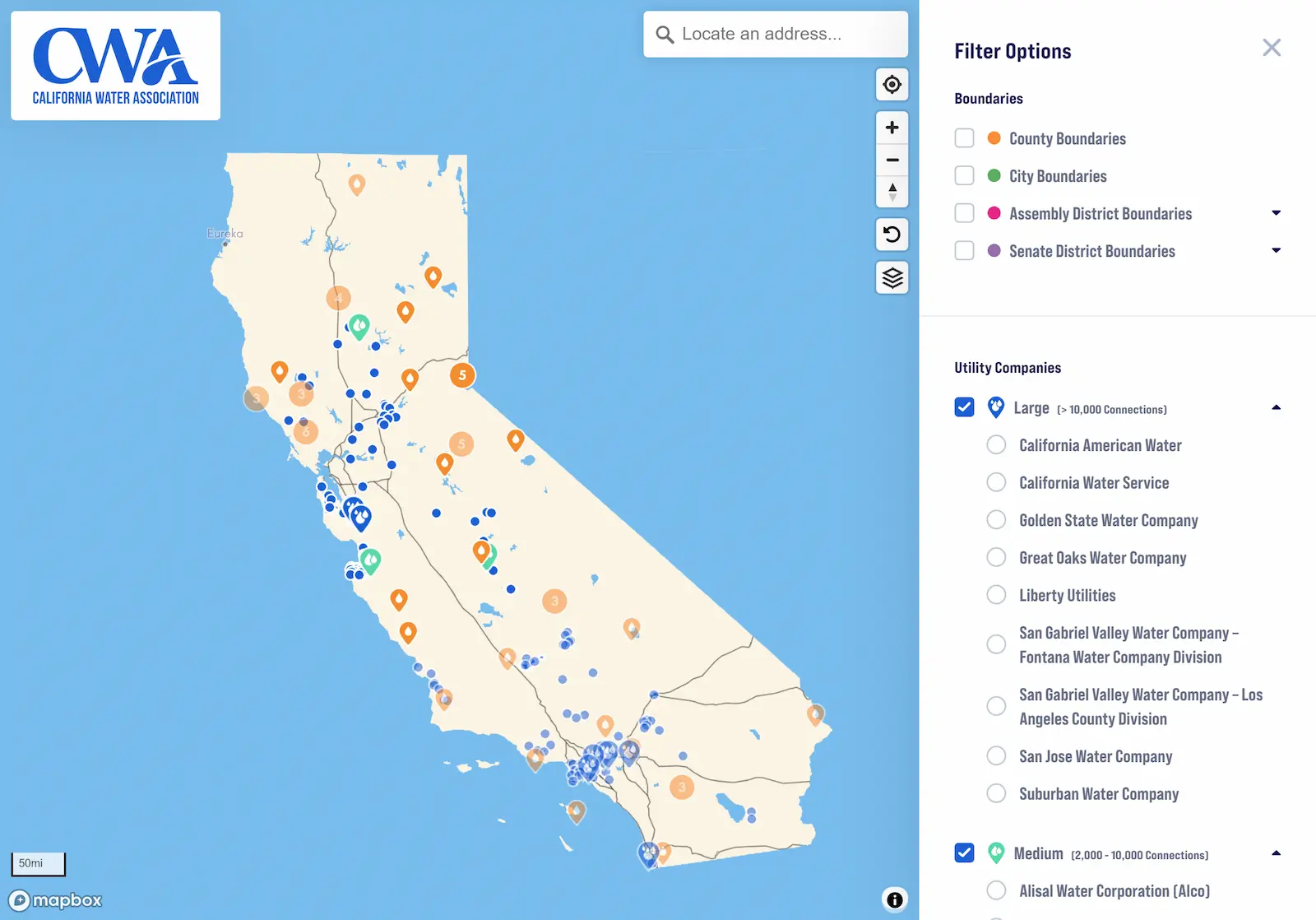“Aquamen and Water Women: Protecting Your Water Service” was the theme of California Water Association’s (CWA) 76th Annual Conference in Monterey on November 7. After welcoming the conference attendees, CWA First Vice President Keith Switzer, who is also Vice President, Regulatory Affairs for Golden State Water Company, served as master of ceremonies for the rest of the day.
Lawrence Morales, President, East Pasadena Water Company and CWA President, followed Switzer with a review of CWA’s accomplishments during the past year, which included successful legislative and regulatory initiatives that served customers’ interests, supporting CWA members’ drought management efforts, strengthening the collective voice of regulated water utilities through effective communications, and advancing work on supplier diversity, the Low-Income Oversight Board, and small company assistance.
The keynote address given by Senate Majority Leader Bill Monning (D-Carmel) focused on “Legislative Solutions to California’s Pressing Water Challenges.” He gave a comprehensive summary of his pending bill, Senate Bill 623, which would establish the Safe and Affordable Drinking Water Fund and provide a consistent source of funding for all Californians to secure access to safe drinking water. The bill would enable eligible applicants to seek funding for a variety of needs, including repairing, replacing or treating contaminated or failing drinking water sources, principally for disadvantaged communities in the state.
During the mid-morning, Phil Jones, Phil Jones Consulting, formerly Washington Utilities and Transportation Commissioner, as well as National Association of Regulatory Utility Commissioners President, spoke about “Protecting Everything and Everybody: Cyber Security and Water Utility Service.” He outlined the cyber challenges facing all utilities today and pointed out a number of opportunities to which utilities can avail themselves for assistance, including federal resources such as the Environmental Protection Agency and the Federal Bureau of Investigation. He also encouraged the attendees to fully understand their utilities’ risk profiles, the proficiency of their SCADA systems, the types of penetration testing they must undertake, and the sophistication of their Incident Response Planning.
“Today’s Water Use and the Next Generation of Savings from Conservation” was the topic of the presentation by Amy Vickers, President, Amy Vickers & Associates, Inc., a nationally recognized water conservation and efficiency expert, engineer, and author. Vickers summarized the nation’s water-use report card, which includes statistics on water-use demands and losses. She also discussed the future savings potential for residential indoor and outdoor water use and concluded with an overview of trends impacting future water use, including home and building trends, landscaping trends, and the increasing participation of children in the “Children and Nature Network,” a Minneapolis-based movement designed to instill an active appreciation of nature in children’s everyday lives.

George Soneff, Partner, Manatt, Phelps & Phillips, LLP followed Vickers’ presentation by sharing “News from the Legal Front.” He covered several recent and ongoing utility eminent domain cases, including Golden State Water Company’s recent victory over the City of Claremont.
Author and humorist Ron Culberson entertained attendees during lunch with a presentation based on his book, Do It Well. Make it Fun. The Key to Success in Life, Death and Almost Everything in Between. Culberson described the two-step process – “Do it Well” and “Make it Fun” – for achieving greater success in work and life. He shared ideas on how to energize boring meetings, defuse office conflict, make project management fun, and more.
The early afternoon began with presentations by Cindy Messer, Chief Deputy Director, California Department of Water Resources, and Joel Ledesma, Deputy Director, State Water Project, Department of Water Resources, focused on “Protecting Our Water Supply.”
Messer provided an update on California WaterFix, a multi-faceted upgrade to California’s aging water system supported by engineers, scientists, water experts, businesses, and environmental groups. The proposed upgrade includes two tunnels, three intakes, and more natural flows in the California Delta to improve water supply reliability, restore the ecosystem, and adapt to climate risks, including levee failures, rising sea levels, and earthquakes. Messer shared the permitting milestones achieved in 2017 and outlined next steps in the permitting process.
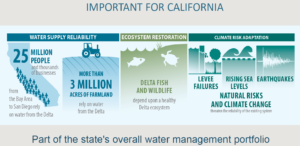
Ledesma described the events leading up to the February 2017 Oroville spillway crisis as well as the collaborative response by various local agencies, including California Water Service. He gave an in-depth report on the progress of the ongoing spillway emergency recovery project.
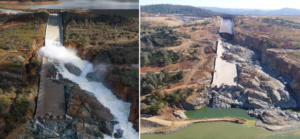
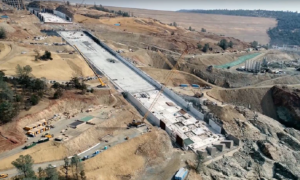
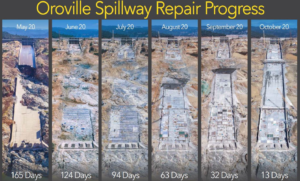
“Protecting Our Water Quality” was the topic of the presentation by John Albert, Chief Research Officer, Water Research Foundation. After explaining the history of the foundation, Albert discussed research being conducted on current and emerging water contaminants such as opportunistic pathogens in premise plumbing. He highlighted potential removal mechanisms and best practices for communicating with customers about the risk of contaminants.
Near the end of the day, Mitch Tobin, Principal, Sea to Snow Consulting/Waterpolls.org presented “Insights on Customer Attitudes Toward Water.” He summarized the results of multiple national and regional customer surveys from recent years dealing with opinions on water supply, water quality and consumers’ knowledge about their own drinking water, including tap water and bottled water. On the plus side, one regional survey indicated that more than 80 percent of consumers consider conservation and water-use efficiency to be their civic duty and, nationally, more than two-thirds of Americans are willing to pay to fix water infrastructure.
Further, nearly three in five people in the Western United States think water is a good value. Given the extensive water infrastructure needs facing the country, customers, of course, are concerned about the level of future rate increases. Tobin noted that although water is less partisan than other issues, recent droughts and the Flint, MI water crisis have made consumers more sensitive to their own water situation, both from a supply reliability and a water quality standpoint. Tobin emphasized that communication and messaging are critical when it comes to customers’ views on recycled water.
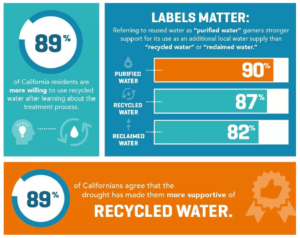
The conference concluded with a presentation by Steve Owen, Vice President, PERC Water, which centered on Pacific Grove’s local water project. Owen gave an overview of the project, which will replace potable irrigation water with non-potable supplies for various municipal properties, including the Pacific Grove Municipal Golf Links and El Carmelo Cemetery.
